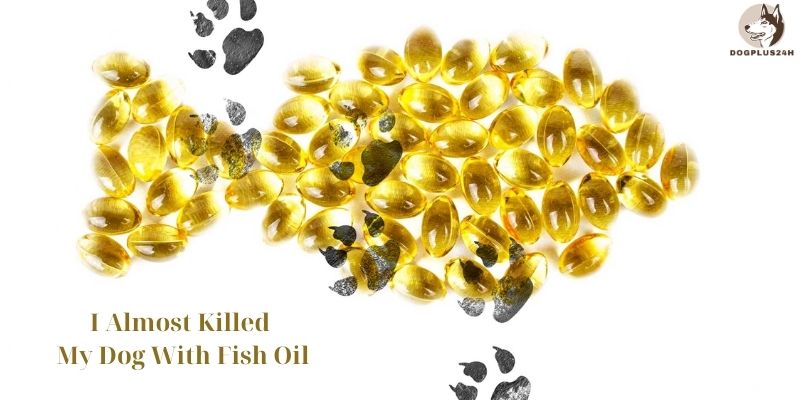Humans can greatly benefit from fish oil. Therefore, it is not surprising that you considered giving it to your dog as a treat or a way to enrich his diet. However, that dreadful error nearly killed your dog! Although it is healthy for us to eat fish oil, our dogs’ varied digestive processes imply that they digest food differently. Let’s talk about why I Almost Killed My Dog With Fish Oil, also some of the benefits and risks of fish oil, and how to safely add it to your dog’s diet. Dogplus24h.com will explain everything you are wondering:
What is Fish Oil?

Dietary supplement fish oil has become very popular in recent years. since it has several health advantages for both people and animals. Fish oil, as its name implies, is made from the tissues of oily fish like salmon, mackerel, and sardines. Typically, the fish’s liver or other bodily tissues are used to extract the oil, which is then refined to remove contaminants.
Omega-3 fatty acids, which the body cannot make on its own and are needed fatty acids, are abundant in fish oil. These fatty acids are essential for keeping one’s health and are involved in many body processes. They control, among other things, brain function, blood coagulation, and inflammation.
Fish oil supplements come in a variety of forms, including those prepared from wild-caught or farmed fish, and are sold in stores. Some dietary supplements are also created using marine materials like phytoplankton or krill oil. Depending on the type of fish and the technique of processing, different fish oil supplements have different advantages.
I Almost Killed My Dog With Fish Oil, why?

The reasons why I Almost Killed My Dog With Fish Oil are listed below:
1. Overdose
Large doses of fish oil can be hazardous for dogs. Lethargy, nausea, vomiting, diarrhea, and decreased appetite are a few signs of a fish oil overdose. It can result in death if ignored.
2. Issues with blood clotting
Supplementing with fish oil may alter how blood clots in the body, which might lead to bleeding issues or even death.
3. Reaction to another drug
Fish oil supplements may have fatal side effects when taken with certain medications, especially blood thinners.
4. Reactions to allergens
Some dogs may develop severe reactions to the compounds in fish oil supplements, leading to anaphylaxis and even death.
5. Compromised liver health
Fish oil supplements may cause liver damage in some dogs, which could lead to diminished liver function and eventual death.
6. Poor quality
Fish oil supplements of low quality may be mislabeled or include contaminants, both of which have potentially catastrophic effects.
Is Fish Oil Required for Your Dog?

About 30% of fish oil is made up of omega-3 fatty acids, with various types of lipids making up the other 70%. Because fish oil is a powerful source of omega-3 and cannot create them on its own, your pet may need to consume it.
It is highly likely that a dog consuming kibble will consume a lot of omega-6. However, too much omega-6 can lead to chronic conditions including allergies and joint pain. A healthy amount of omega-3 helps balance and counteract the detrimental effects of omega-6.
The following signs of an omega-3 deficit in dogs may appear:
- Kidney conditions
- Vascular conditions
- Joint wellness
- Concerns about mental health
- Specific cancers
Although adding fish oil to your pet’s food may be beneficial, you should only do so after contacting your veterinarian.
Fish oil benefits for dogs
1. Enhance Heart Health
One of the most well-known advantages of fish oil is improved heart health in animals. The benefits of omega-3 fatty acids can help your pet’s heart, circulatory system, and overall wellness. These benefits are especially beneficial for dogs that have heart issues. Heartworms and pulmonary problems in dogs are uncommon when their hearts are healthy.
2. Enhance Joint Health
Many dogs get joint issues as they age, especially specific breeds like Chow Chows, Labradors, and Retrievers.
Although any breed of dog could have the illness, little dogs are less likely than medium or large dogs to have joint issues. Fish oil and omega-3 fatty acids can help with joint health. Additionally, if your dog’s joints are already hurting, fish oil can help to ease some of the discomfort. It’s a terrific choice when used in conjunction with other therapies if your veterinarian has given the combination the go-ahead.
3. Blood Condition
Your dog’s general health is greatly impacted by fish oil. Fish oil improves the circulation system and strengthens the heart. Additionally, fish oil may help certain dogs with their triglyceride levels. For pets with issues with their bowels, hearts, or pancreas, this is a significant advantage. However, this is not the sole option; always seek the advice of your veterinarian.
4. Enhance The Health Of The Skin
Skin dryness is an issue for both people and animals. Sometimes, this is the cause of issues or illnesses in household dogs. Commonly involved in skin conditions are, but are not restricted to:
- Food or environmental allergies
- Folliculitis
- Impetigo
- Candida infections
- Ringworm
- A rash or dandruff
- Lupus
- Manage
In dogs, each of these ailments and conditions is common. Fish oil supplements can ease the symptoms, though they won’t make them go away. Additionally, the health benefits can stop any of these diseases from even starting in the first place. If they believe your pet has one of these ailments, see your veterinarian before feeding them fish oil.
The best plan of action is to make sure your pet is safe, as different medications or supplements can combine negatively.

6. Boost Kidney Wellness
Blood pressure elevation and protein loss are two consequences of failing kidneys. You can maintain lost proteins and vitamins with fish oil while decreasing blood pressure. Furthermore, fish oil may help to reduce the production of inflammatory chemicals. These compounds have the potential to harm your dog’s health and create pain by causing kidney damage or irritation.
7. Canines Have Better Cognitive Function
While vitamins play a variety of functions in the body, omega-3 is particularly crucial for promoting brain development. Giving fish oil to a young dog can help with nervous system development. Fish oil also aids in the treatment of various neurological diseases. Your veterinarian might suggest fish oil for panic and separation anxiety, even though it’s doubtful that it would be the only course of treatment.
When should I avoid giving fish oil to my dog?
1. Having pancreatitis in your dog
When a dog already has pancreatitis, fish oil may occasionally increase the synthesis of pancreatic enzymes, which is hazardous. As a result, if your dog has a history of pancreatitis, you should not give him fish oil.
2. If your dog cannot consume seafood
Dogs can develop allergies to particular types of fish, including salmon, just like people can. Therefore, it is advised against providing your dog fish oil if they have ever experienced a seafood allergy.
3. If your dog takes prescription medication
Some drugs that may interact with fish oil include NSAIDs, steroids, and blood thinners. Before giving your dog fish oil, check with your veterinarian to see if they are already on any of these medications.
4. If your dog has an issue with bleeding
Fish oil thins the blood, which may worsen bleeding issues in dogs. Before administering your dog fish oil, it is essential to inquire with your vet about any bleeding issues.
5. If your dog currently eats a healthy diet
It’s crucial to remember that while fish oil supplements for dogs can be highly healthy, your dog shouldn’t solely take fish oil. You might not need to give your dog fish oil if they already have a nutritious diet.
What Kind Of Fish Oil Is Best For Dogs?
When selecting a fish oil supplement for your dog, there are a few things you should keep an eye out for.
It’s crucial to remember that just because fish oil is expensive, it doesn’t necessarily mean it’s of the highest caliber. There are numerous high-quality, affordable choices available.
Unknown sources of dubious fish oil supplements may contain chemicals and heavy metals that are harmful to your dog. Therefore, you should check that the fish oil supplement you select contains the following qualities:
- The absence of heavy metals and poisons is confirmed by an independent laboratory’s certificate of analysis.
- The fish oil bottle ought to indicate where it came from.
- To shield it from light, the fish oil should be kept in a dark-colored bottle.
- Dogs can benefit from high-quality fish oils like Nordic Naturals, Zesty Paws, and Grizzly Salmon Oil.
Several excellent sources of fish oil for canines are:
- Fish oil
- crude krill
- Fish liver oil
- Salmon oil
Research is essential when deciding which kind of fish oil is best for your dog. Make careful to read the labels, and only select goods that are of the highest caliber, are designed specifically for dogs, and come from reliable sources.
Your veterinarian can guide you if you’re unsure about using a fish oil supplement.
5 Alternatives to Fish Oil For Dogs
I Almost Killed My Dog With Fish Oil, a revelation that highlights the possible risks of a supplement that many pet owners originally believed to be safe. A shift toward alternate omega-3 sources that provide nourishment without the risk has been pushed by the search for canine health. These substitutes address a variety of dietary requirements and sensitivities, ensuring that pets receive vital nutrients without the side effects linked to fish oil.
1. Coconut oil
Since coconut oil includes a lot of lauric acids, which have anti-inflammatory and immune-boosting properties, it is a great alternative to fish oil for dogs. Additionally, it can improve the health of your skin and coat while promoting digestion.
2. Flaxseed Oil
Flaxseed oil has a lot of omega-3 fatty acids, which can help dogs have reduced inflammation and better joints and coats. Dogs who might be allergic to fish will also benefit greatly from this substitution.
3. Chia Seeds
Chia seeds are a great source of Omega-3s, fiber, and antioxidants, therefore they can be used in place of fish oil in the diets of dogs. They can also improve the immune system, reduce inflammation, and give dogs healthier fur.
4. Kristin Oil
Krill oil is yet another wonderful alternative to fish oil in the meals of dogs because of its high concentration of Omega-3 fatty acids and potent antioxidant content. Additionally, it can strengthen the immune system, lessen inflammation, and enhance the condition of dogs’ joints.
5. Hemp Oil
Hemp oil is an ideal substitute for fish oil in dogs since it is high in Omega-3s and Omega-6s, essential fatty acids that support immune system health, boost coat health, and reduce inflammation. Additionally, because it is a great source of protein and has anti-anxiety properties, it is a great option for worried dogs.

FAQs about using Fish Oil for Dogs:
1. Can Puppies Consume Salmon Oil?
Salmon oil is safe to give to pups and may even improve their health. Omega-3 fatty acids, in especially EPA and DHA, which are critical for a puppy’s brain, vision, and general growth, are abundant in salmon oil. These fatty acids also promote glowing fur and healthy skin. A veterinarian should be consulted to determine the proper dosage for the age, size, and nutritional requirements of your particular puppy since too much of some nutrients can be detrimental. Use high-quality salmon oil supplements made specifically for dogs, as some human supplements could contain chemicals that are harmful to puppies.
2. Is Fish Oil Good for My Dog’s Skin?
There are topical fish oil treatments made specifically for dogs. These goods frequently take the shape of fish oil-infused shampoos, conditioners, or skin care products. Without the requirement for oral supplementation, topical fish oil solutions can deliver the advantages of omega-3 fatty acids straight to a dog’s skin and coat. They can assist with itching, dry skin, and coat health.
3. Does Salmon Oil Promote Shedding?
Yes, fish oil, especially salmon oil, can aid in reducing dog shedding. Omega-3 fatty acids, found in abundance in fish oil, support healthy skin and coat, with the ability to lessen excessive shedding and enhance coat quality. However, it’s crucial to seek advice from a veterinarian for the right dosage and suggestions catered to the requirements of your particular dog.
4. Can Fish Oil Treat Dogs’ Itchy Skin?
Yes. Dogs with itchy skin benefit from fish oil. This is due to the presence of omega-3 fatty acids in fish oil, which have anti-inflammatory characteristics that can lessen skin irritation and relieve itching. By preserving moisture and fostering a lustrous coat, omega-3 fatty acids also aid in the health of the skin. When given in the right amount under a veterinarian’s supervision, fish oil can be a useful supplement for treating dogs with itchy skin conditions.
5. How much fish oil should a dog consume?
The amount of fish oil that a dog can consume will vary depending on their weight, age, and state of health. In order to avoid any potential health issues, it is always advisable to discuss any pet nutrition plans with your veterinarian.
They may aid you in figuring out the right dosage for your dog based on their requirements. The typical range of EPA and DHA supplement dosages is 50 to 220 mg/kg body weight.
6. How long does fish oil take to start affecting dogs?
Depending on the dog, fish oil may have different effects. Typically, it takes your dog’s body 30 days of regular doses of omega-3 fatty acids to build up sufficiently to affect any significant changes. Therefore, a dog may experience relief from some diseases in as little as 30 days.
All dogs, however, are unique; some might see a difference right away, while others might need more time. Additionally, it may take some dogs 3–4 months to attain their new levels of omega-3 fatty acids, therefore it is advisable to test this supplement on your dog for at least 1–4 months to see how they react.

